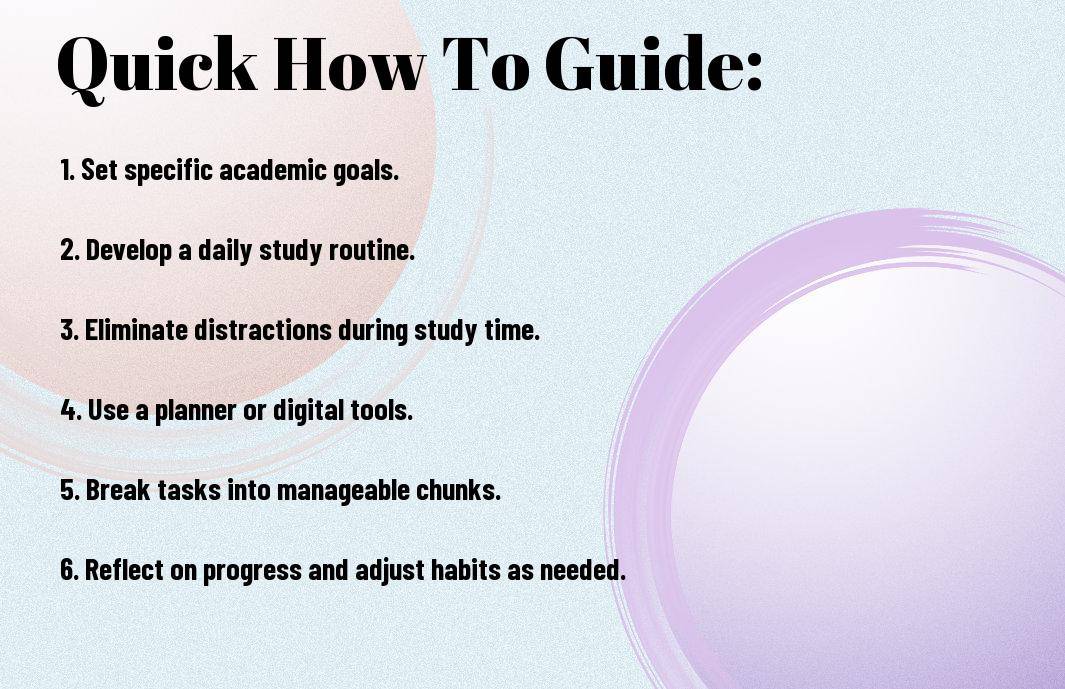
Newsletter Subscribe
Enter your email address below and subscribe to our newsletter

Enter your email address below and subscribe to our newsletter

Academic success and time management! Success in academia is not just about talent; it’s also about developing effective habits that support your goals. One of the key elements to excelling in your studies is time management. By incorporating the principles of Atomic Habits into your daily routine, you can establish a solid foundation for academic success.

Now, to develop *atomic habits* for study, you first need to identify your current habits. Take a moment to reflect on how you currently approach studying. Do you have a set study schedule or do you study whenever you find the time? Are you easily distracted while studying or do you have a focused study environment? By understanding your current habits, you can begin to make changes for the better.
Now, after identifying your current habits, it’s time to create powerful study routines. Here are some tips to help you develop effective study habits:
After implementing these tips, you should start to notice improvements in your study habits and academic performance.
All successful individuals know the value of time management. It is not about managing time; it is about managing ourselves efficiently within the time we have. Atomic Habits can help transform the way we approach our tasks and goals, ensuring we make the most of every minute.
With the Eisenhower Matrix, tasks are categorized into four quadrants based on their urgency and importance. Quadrant 1 includes tasks that are urgent and important, while Quadrant 2 is for important but not urgent tasks. Quadrant 3 is for urgent but not important tasks, and Quadrant 4 is for tasks that are neither urgent nor important. By assigning each task to the appropriate quadrant, you can focus on what truly matters and avoid the trap of busyness.
Procrastination can be a significant barrier to academic success. Stay on track with these strategies:
Thou can conquer procrastination by taking consistent, small steps towards your goals and maintaining a positive mindset.
Once again, we explore into the power of atomic habits and how they can transform your academic success and time management. In this chapter, we will explore how leveraging the compound effect can lead to remarkable outcomes over time.
The compound effect is the principle of reaping huge rewards from a series of small, smart choices. When applied consistently towards your academic goals, even the smallest actions can lead to significant results over time. Every assignment completed, every minute of focused study, and every small improvement in your routine contributes towards your overall success. By understanding and harnessing this concept, you can make positive changes that will accumulate and pay dividends in the long run.
Some of the most successful students understand that consistency beats intensity when it comes to building sustainable habits. Instead of cramming all your study hours into a few days, focus on consistently dedicating a set amount of time each day to your academic pursuits. This steady approach not only reduces stress and burnout but also helps in retaining information better. Regular, small efforts repeated over time will far outweigh sporadic bursts of intense study sessions.
Habits are the building blocks of academic success and efficient time management. By establishing small, sustainable routines and consistently sticking to them, you can make notable progress towards achieving your goals in a manageable and effective way.
For students striving for academic success, setbacks are an inevitable part of the journey. Whether it’s receiving a lower grade than expected on a test or falling behind on assignments, setbacks can be discouraging. However, it’s crucial to remember that setbacks are not a reflection of your abilities but rather an opportunity for growth and improvement.
From setbacks, it’s important to learn from the experience and use it as motivation to do better next time. Reflect on what went wrong and identify areas where you can improve. Develop a plan to address these weaknesses and stay committed to your goals. Do not forget, success is not linear, and setbacks are just bumps along the road to achieving your academic goals.
The key to academic success and effective time management lies in the ability to maintain focus, especially in the face of distractions. Avoid multitasking and instead, prioritize tasks based on their importance and urgency. Set specific goals for each study session and eliminate distractions such as social media or noisy environments. Practice mindfulness to stay present and focused on the task at hand.
Recognizing when distractions are taking away from your productivity is the first step in overcoming them. By implementing these tips, you can enhance your focus and maximize your academic performance.
Your mindset plays a crucial role in determining your academic success. The way you perceive challenges, setbacks, and growth opportunities can greatly influence your performance. Developing a growth mindset can empower you to embrace challenges, learn from failures, and persist in the face of obstacles.
Habitual learning is key to fostering a growth mindset in academics. By developing a habit of continuous learning and improvement, you can train your mind to see challenges as opportunities for growth. Make it a habit to seek out new information, reflect on your progress, and embrace feedback as a means to improve.
Assuming a growth mindset is necessary, but fostering resilience and adaptability is equally important for academic success. When faced with challenges or setbacks, it’s crucial to maintain a positive outlook and look for ways to adapt and overcome obstacles. Remember that setbacks are not permanent and can be valuable learning experiences.
Plus, remember that academic success is not just about getting good grades, but also about developing skills like resilience, adaptability, and a growth mindset. By cultivating these qualities, you’ll not only excel in your academic pursuits but also thrive in various aspects of your life.
Now, when delving into how to integrate Atomic Habits Book Summary: Key Takeaways & review into your social and personal life, it’s important to understand how habits can shape your relationships and academic success.
Perceiving the interconnectedness between your social and study life can help you make informed decisions that benefit both aspects.
Recognizing the importance of harmonious relationships in achieving academic success can lead to a more fulfilling college experience.
Influence these relationships by fostering open communication, setting realistic expectations, and prioritizing self-care. Remember that maintaining a healthy social life is crucial for your well-being and academic progress.
Recognizing the significance of balance between social interactions and academic pursuits can help you thrive and excel in both areas.

Considering all points, integrating the principles of Atomic Habits into your routine can greatly enhance your academic success and time management. By focusing on small changes and building positive habits, you can improve your study efficiency and productivity. To further apply these concepts to your studying techniques, check out How to Apply Atomic Habits to Studying to Get Better Grades.
A: Atomic habits are important for academic success because they focus on making small, consistent changes that can lead to big improvements over time. By developing good habits related to studying, time management, and organization, students can create a solid foundation for academic success.
A: You can use atomic habits to improve your time management skills by breaking down larger tasks into smaller, more manageable steps. By consistently practicing good time management habits, such as using a planner or setting specific goals for each study session, you can gradually improve your ability to prioritize tasks and stay organized.
A: Some examples of atomic habits for academic success include setting aside a specific time each day for studying, breaking up study sessions into smaller intervals with short breaks in between, and creating a to-do list at the beginning of each week to prioritize tasks.
A: The time it takes to form a new atomic habit can vary depending on the individual and the complexity of the habit. On average, it can take anywhere from 18 to 254 days to form a new habit, with the most common time frame being around 66 days.
A: You can stay motivated to maintain your atomic habits for academic success by setting clear goals, tracking your progress, and rewarding yourself for small victories along the way. It’s also helpful to surround yourself with a supportive community of peers or mentors who can help hold you accountable and provide encouragement.
A: Some common obstacles to developing atomic habits for academic success include procrastination, lack of motivation, and difficulty staying consistent. It’s important to identify these obstacles and develop strategies to overcome them, such as breaking tasks into smaller chunks or finding a study buddy to help keep you on track.
A: You can incorporate atomic habits into your daily routine for academic success by starting small and gradually building up to more complex habits. Begin by focusing on one or two key habits, such as setting a specific study schedule or practicing active listening in class, and then gradually add more habits as you become more comfortable with the process.
Eat That Frog – Brian Tracy’s Approach to Tackling the Most Challenging Task First
Pomodoro Technique – Francesco Cirillo’s Method to Improve Focus and Manage Time
Learning to Say No – The Importance of Prioritizing Tasks and Commitments
SMART Goals – George T. Doran’s Method for Setting Clear and Achievable Goals
The 2 Minute Rule – David Allen’s (popularized) Trick to Overcome Procrastination and Start Tasks